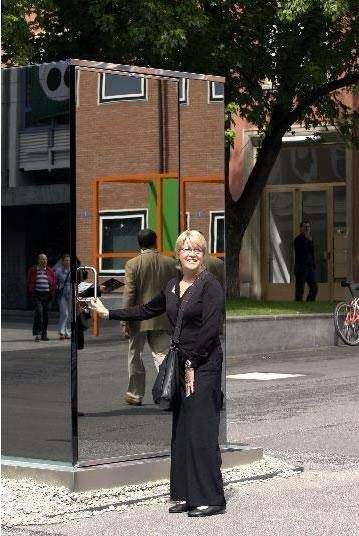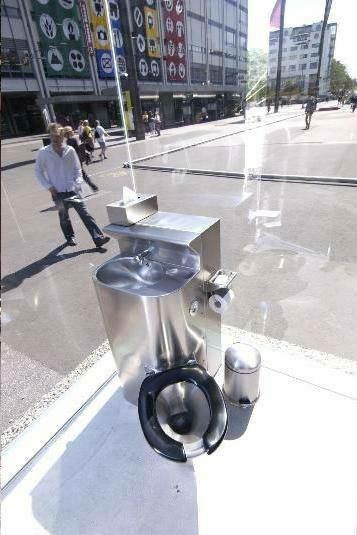|
|||||||||||||||
Vol. 18, No. 36, MARCH 6, 2006 |
|||||||||||||||
The Friday Program:
George Bridges became the 13th president of Whitman College on July 1, 2005, and was installed in the office on November 5, 2005. Dr. Bridges came to Whitman from his previous position as dean and vice provost of undergraduate education at the University of Washington. While there, he administered the Honors Program and the Mary Gates Endowment, the university’s single largest endowment to support undergraduate scholarships. Dr. Bridges earned his undergraduate degree in 1972 from the University of Washington and pursued his graduate studies at the University of Pennsylvania. He earned his MA in criminology (1973) and his Ph.D. in sociology (1979). He is married to Dr. Kari Tupper, who is also on the faculty at Whitman. The couple has four children. President Steve greeted the new day, welcoming PDG Rosemary Aragon, DG Sally Gray and, who Steve called “A Future District Governor,” Sharon Edberg. Sharon, Past President of the BBRC, is now a member of the South Whidbey Rotary Club, but finds the occasion to come and visit.
David Bolson capped off a successful Vocational Service project reporting that 2,550 books were donated during February for the club book drive. The proceeds were taken to Hopelink to stock their library. Shelley Noble reported that books were already being checked out by many people who are making good use of them. Congratulations to the BBRC for another great project. And, David, you can come read to us any old time! Just over the hill you’ll see a rainbow! You thought it covered Mt. Si, but truth be known, the other end stops in Leavenworth, the site of this year’s BBRC Planning Retreat. The current registration list shows 44 members are rarin’ to go for this year’s event. It opens Friday afternoon, March 31, at the Enzian Inn in Leavenworth. There’s a nice dinner planned that evening to which guests and spouses are invited. The next morning, breakfast will precede the planning meeting, when all comers will bear down to discuss the issues before the club. The exercise will continue through the morning on Saturday, April 1, concluding at noon. There may be some members who cannot join the crew Friday evening but who will want to participate in the discussions at the retreat. In that case, carpools can be arranged to bring a car full of attendees for the Saturday meeting only. It’s vital that as many members as possible can participate in the retreat. That’s what makes the BBRC special ... we plan, we work and we do. This is an important time, what with decisions being made regarding the club’s fundraising projects. Contact Jim Zidar for questions or comments. Three Members Inducted: Howell, Meyer, Everist Elena Howell, Mark Meyer and Jim Everist became the BBRC’s newest members Friday morning in ceremonies conducted by President Lingenbrink. Mentors, committee chairs and sponsors gathered at the front of the room to give these three new members a proper send-off. Elena Howell Mark Meyer Jim Everist Bob Moloney will mentor Mark and Jim. Chris Ballard will mentor Elena. President Steve told the new members that their new organization stretches around the globe, with Rotary clubs in 167 countries. “You can travel anywhere (just about) and find a Rotary club. You’ll be welcome wherever you go. You’ve got a lot to learn about Rotary, and having the book ‘ABC’s of Rotary’ will help. Remember our motto is ‘Service Above Self.’ You get out of Rotary what you put in. We know you’ll be great Rotarians.” The crowd rose as one to give the three new members their standing ovation.
The Friday Program:
George Bridges became the 13th president of Whitman College on July 1, 2005, and was installed in the office on November 5, 2005. Dr. Bridges came to Whitman from his previous position as dean and vice provost of undergraduate education at the University of Washington. While there, he administered the Honors Program and the Mary Gates Endowment, the university’s single largest endowment to support undergraduate scholarships. Dr. Bridges earned his undergraduate degree in 1972 from the University of Washington and pursued his graduate studies at the University of Pennsylvania. He earned his MA in criminology (1973) and his Ph.D. in sociology (1979). He is married to Dr. Kari Tupper, who is also on the faculty at Whitman. The couple has four children. Dr. Bridges warmed up his audience by observing that the BBRC “is a pretty fun group. In fact, I’d say you people are really funny!” He said that Whitman College is the most selective institution of its kind in the West. “The freshman class has a 3.9 GPA. They are part of the 1462 students enrolled. We’re small, with representation from every state in the U.S. Whitman is a Liberal Arts college with an education that’s personal and highly supportive. Our students learn to write and read and they end their senior year with oral and written exams. We’re a school that focuses on the ‘whole student,’ and more than half of the student body studies abroad.” A "student engagement survey" is taken frequently among schools in this country, asking students for their experiences and reporting that feedback to the college. Whitman is “off the charts in two categories: academic rigor and support of the student experience. It’s a great place to be. I’m honored to be its president.” He told a story about his first year at the school last fall. “Rush had begun. We have several fraternities on campus. I decided to dress down and go see what was going on. In my Levis, sport shirt, running shoes and cap, I thought I’d get a better view of the proceedings. A noisy rush party was going on in the Phi Delt’s backyard. The beer was flowing pretty good, but everyone seemed on their best behavior.”
Dr. Bridges brought with him a serious discussion about the challenges facing higher education. The State of Washington faces some major challenges: Access. “Washington has a big problem: there are fewer seats available at our institutions of higher learning. Washington ranks 47th out of 50 on access. We have not invested in access. It’s critical. Education is the last great equalizer in our society. We have to find a way to make it more accessible. Financial considerations also limit access. It costs $29,000 to attend Whitman for a year. Even with subsidies from our endowment, costs are just too high. It’s becoming a situation of the haves and have-nots. Access is a big issue.” Diversity. “Colleges, by definition, must be diverse. Time will change the face of our communities. They will look very different from how they look today. We are going for diversity in our student body, our staff and faculty. Part of learning is to know what it’s like to be among different people.” Dr. Bridges took a group of 40 UW students to Cuba a couple of years ago. “It was a truly amazing experience for all of us. We need to increase international studies to give the next generation the experience of leadership.” Going to school in Walla Walla may seem isolated, tucked away as it is in the foothills of the Blue Mountains in Washington’s southeast corner. “But, we’re finding that parents of our students enjoy coming over here to see our community. The city has changed and improved in the last several years. And, there are 80 wineries within a short distance of the city. It’s a growing and active area.” Opening up his visit for questions, Dr. Bridges fielded an affordability question from Jim Gordon. The point was made that middle-income families don’t qualify for student loans. Although Whitman has a $400 million endowment, Dr. Bridges said that this is “one of society’s challenges to keep the cost affordable.” He was asked about the make-up of the student body — 50% of the “seats” are occupied by Washington residents and 30% are from out of state. Dr. Bridges said that all of higher education “needs to find ways to get kids in the door. For the good of the coming generations and the health of our state, we need to create more space and do it soon.”
A discussion followed about entrance criteria. Dr. Bridges said that all students seeking admission to Whitman (400 seats out of 3500 applications) must write three essays. “The topics are obscure enough that they have to write their own work! Every student gets an interview. This is the best predictor about how they will perform. They’ve got to show they can solve problems, overcome obstacles. SAT scores are terrible predictors.” Dr. Bridges closed by saying that “we’ll be having a new arms race over education in the near future. Our society is not investing in education. Developing countries are pouring every dime they have into higher education. The U.S. is losing this battle. I’m talking about investing in the whole of education ... math and science ... literacy. It’s all about investment.” For his presentation, Dr. Bridges was awarded a certificate that signifies a book has been donated in his name to the King County Library System’s Ready-to-Read program, which dovetails beautifully in support of Rotary’s fight to improve literacy. Thanks to Rick Klobucher for his introduction. WOULD YOU USE THIS? OUTSIDE VIEW INSIDE VIEW |



 While at the lectern, DG Sally gave a great pitch for attendance at the District Conference, April 21-23, at Whistler B.C. “We’re looking forward to your participation at this year’s event. At the majestic Whistler resort, we’ll headquarter at the Fairmont Chateau Whistler. We’re going up the mountain by gondola for a special dinner. Conference topics include literacy and water projects and a report from World Vision. Please register by going to the
While at the lectern, DG Sally gave a great pitch for attendance at the District Conference, April 21-23, at Whistler B.C. “We’re looking forward to your participation at this year’s event. At the majestic Whistler resort, we’ll headquarter at the Fairmont Chateau Whistler. We’re going up the mountain by gondola for a special dinner. Conference topics include literacy and water projects and a report from World Vision. Please register by going to the 
 Former BBRC Rotarian Ernie Hayden is making great strides in his rehabilitation from surgery and treatment for injuries suffered in a fall at his home several weeks ago. Ernie was baiting some rodent traps in his attic when the ceiling gave way. He broke his ankle and banged up his vertebrae. Just this week, the cast has come off the ankle and he’s hoping to get the body armor removed around his back in the next week or so. Ernie is doing some telecommuting with his employer, the Port of Seattle, and is itching to get up and getting back to work.
Former BBRC Rotarian Ernie Hayden is making great strides in his rehabilitation from surgery and treatment for injuries suffered in a fall at his home several weeks ago. Ernie was baiting some rodent traps in his attic when the ceiling gave way. He broke his ankle and banged up his vertebrae. Just this week, the cast has come off the ankle and he’s hoping to get the body armor removed around his back in the next week or so. Ernie is doing some telecommuting with his employer, the Port of Seattle, and is itching to get up and getting back to work.
 Rick Klobucher, graduate of Whitman, termed it a “little gem in the city they named twice — Walla Walla.” Some opening stats: 10 to 1, student-faculty ratio; 15, the size of classes; 24/7, hours the library is open; 15, the number of acres within the campus; 1 to 3, students to trees! Rick introduced Whitman’s president, Dr. George Bridges.
Rick Klobucher, graduate of Whitman, termed it a “little gem in the city they named twice — Walla Walla.” Some opening stats: 10 to 1, student-faculty ratio; 15, the size of classes; 24/7, hours the library is open; 15, the number of acres within the campus; 1 to 3, students to trees! Rick introduced Whitman’s president, Dr. George Bridges. Friday Potpourri
Friday Potpourri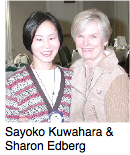 Steve introduced Steve Vincent to deliver the invocation and lead the pledge; Steve Luplow entertained with introductions of four visiting Rotarians and a host of guests.
Steve introduced Steve Vincent to deliver the invocation and lead the pledge; Steve Luplow entertained with introductions of four visiting Rotarians and a host of guests. Elena is a native of Siberia, coming to this country several years ago as an interpreter in Japanese. (Now Sayoko has someone to talk to!) She and her husband Daniel and 10-year-old son Gherman live in Lynnwood, and Elena works at UBS Financial Services in Bellevue. Her classification is “Investment Manager.” She’s been active as Treasurer
Elena is a native of Siberia, coming to this country several years ago as an interpreter in Japanese. (Now Sayoko has someone to talk to!) She and her husband Daniel and 10-year-old son Gherman live in Lynnwood, and Elena works at UBS Financial Services in Bellevue. Her classification is “Investment Manager.” She’s been active as Treasurer  Mark is a former Rotarian with a club in Hartland, Wisconsin, for eight years. Mark and his wife Ann live in Bellevue and are parents of six children, with just one at home (that’s Alex). Mark’s classification is “Flag Manufacturing,” and he’s a partner in Alphasoft Wearables in Bellevue. His community involvement includes the Homebound Ministry at First Presbyterian Church in Bellevue. He is a member of the National Flag Dealers Association, and he enjoys singing, sailing, woodworking, skiing and cruising. His sponsor is Phil Salvatori.
Mark is a former Rotarian with a club in Hartland, Wisconsin, for eight years. Mark and his wife Ann live in Bellevue and are parents of six children, with just one at home (that’s Alex). Mark’s classification is “Flag Manufacturing,” and he’s a partner in Alphasoft Wearables in Bellevue. His community involvement includes the Homebound Ministry at First Presbyterian Church in Bellevue. He is a member of the National Flag Dealers Association, and he enjoys singing, sailing, woodworking, skiing and cruising. His sponsor is Phil Salvatori. Jim is the President of Everist Office Technology, Inc., a Bellevue firm that is an authorized sales agent for Xerox office products. Jim and his wife Kathleen live in Bellevue, and they have three children. Jim’s classification is “Office Technologies.” His community activities include serving as Board Member of Childhaven, 1982-1990; Habitat for Humanity; and Sacred Heart Church volunteer projects. He is a member of the UW Executive MBA Alumni Association. Jim says he played trumpet in high school — he might have to dust off the horn! His hobbies include golf, hiking, coaching little league, and participating in various 10K runs. Jim has climbed Mt. Rainier twice! He is also a charter member of the Bellevue Athletic Club. His sponsor is Phil Salvatori.
Jim is the President of Everist Office Technology, Inc., a Bellevue firm that is an authorized sales agent for Xerox office products. Jim and his wife Kathleen live in Bellevue, and they have three children. Jim’s classification is “Office Technologies.” His community activities include serving as Board Member of Childhaven, 1982-1990; Habitat for Humanity; and Sacred Heart Church volunteer projects. He is a member of the UW Executive MBA Alumni Association. Jim says he played trumpet in high school — he might have to dust off the horn! His hobbies include golf, hiking, coaching little league, and participating in various 10K runs. Jim has climbed Mt. Rainier twice! He is also a charter member of the Bellevue Athletic Club. His sponsor is Phil Salvatori.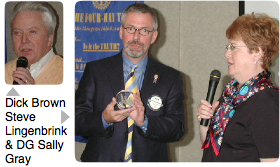 Dick Brown, representing the Rotary Foundation, reminded members to make their commitment for this Rotary year by contacting the Foundation committee members. The theme of “Every Rotarian, Every Year” asks that each member participates, with an average $300 a year contribution. Your commitment needs to be made soon, since we’re entering the final quarter of this year. You’ll want your commitment to count.
Dick Brown, representing the Rotary Foundation, reminded members to make their commitment for this Rotary year by contacting the Foundation committee members. The theme of “Every Rotarian, Every Year” asks that each member participates, with an average $300 a year contribution. Your commitment needs to be made soon, since we’re entering the final quarter of this year. You’ll want your commitment to count.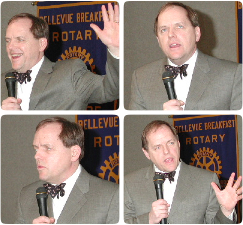 Rick Klobucher, graduate of Whitman, termed it a “little gem in the city they named twice — Walla Walla.” Some opening stats: 10 to 1, student-faculty ratio; 15, the size of classes; 24/7, hours the library is open; 15, the number of acres within the campus; 1 to 3, students to trees! Rick introduced Whitman’s president, Dr. George Bridges.
Rick Klobucher, graduate of Whitman, termed it a “little gem in the city they named twice — Walla Walla.” Some opening stats: 10 to 1, student-faculty ratio; 15, the size of classes; 24/7, hours the library is open; 15, the number of acres within the campus; 1 to 3, students to trees! Rick introduced Whitman’s president, Dr. George Bridges.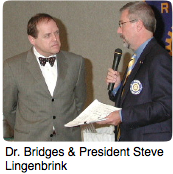 The President completed his tour and went back to his office. He talked to an associate about what he’d seen. The conversation got around to the fact that the Phi Delt house was “dry.” The president didn’t think it looked dry to him. The backyard was littered with beer cans. He asked the chapter president for an explanation. “I received a fifteen-page report that would do any lawyer proud. This young man, like many of our students, is primed for leadership and excellence. His conclusion was that the Betas had thrown those beer cans there!”
The President completed his tour and went back to his office. He talked to an associate about what he’d seen. The conversation got around to the fact that the Phi Delt house was “dry.” The president didn’t think it looked dry to him. The backyard was littered with beer cans. He asked the chapter president for an explanation. “I received a fifteen-page report that would do any lawyer proud. This young man, like many of our students, is primed for leadership and excellence. His conclusion was that the Betas had thrown those beer cans there!”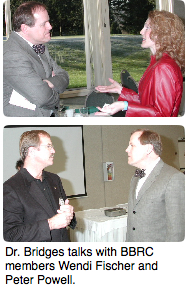 Another question asked how to go about expanding the seats available. Dr. Bridges said that Whitman has the best model of education. “It’s an experiential model, where small groups meet and learn. Whitman is about relationships between professor and student. We have to ask ourselves, ’How important is our future?’”
Another question asked how to go about expanding the seats available. Dr. Bridges said that Whitman has the best model of education. “It’s an experiential model, where small groups meet and learn. Whitman is about relationships between professor and student. We have to ask ourselves, ’How important is our future?’”